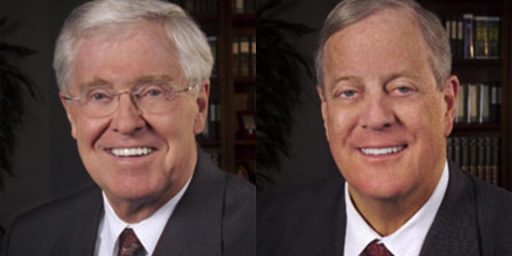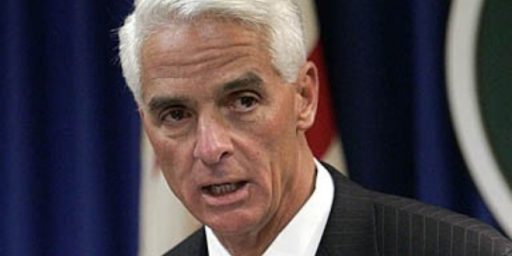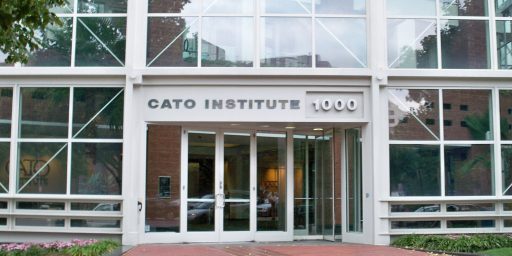Are Billionaires Replacing Political Parties?
Rich guys are backing organizations that are taking over traditional party functions. Is that a problem?
Jim Rutenberg, chief political correspondent for NYT magazine, purports to explain “How Billionaire Oligarchs Are Becoming Their Own Political Parties.” He takes the standard arguments against Citizens United and big money in politics to a new level.
His lead-in anecdote follows on the Florida governor’s race, which is a rerun of the last one, pitting now-incumbent Republican Rick Scott against former governor and erstwhile Republican Charlie Crist.
In the spring, when Crist was riding a double-digit lead, Florida looked like a safe bet, but then Scott unleashed an $18 million ad campaign against Crist, painting him as a hack careerist who loves Obamacare and lays off teachers. Not only had Crist’s lead vanished, now he was losing in the key swing district of Tampa, winning by too little in Democrat-friendly West Palm and losing by too much in Republican-leaning Fort Myers. And as Baldick’s numbers showed, neither the state Democratic Party nor Crist could match the barrage.
You can guess what comes next:
[Tom Steyer] made his money as the founder of a successful hedge fund called Farallon Capital Management and so had spent most of his adult life wading through prospectuses and annual reports. He seemed enthralled and energized by his new course of study in domestic politics, with its incongruent mix of idealism and cynicism. This was democracy in action, real people making real change, not just mysterious figures behind closed doors. Tall, with grayish blond hair and shaggy sideburns, Steyer was in constant motion: his arms waving, his hands slicing the air, his tie — always the same stiff, scotch plaid — swaying to and fro as he spoke. In talking about the political offshoots of his money, he sometimes had the air of a new father.
Steyer’s long-term goal was to build an organization called NextGen Climate Action, which could mirror and oppose the rival private interests who devoted their own fortunes to blocking any action on climate change. Chief among those rivals were Charles and David Koch, the brothers who run Koch Industries. Steyer was especially interested in enacting a cap-and-trade system, which would allow companies to buy or sell emission rights under a strict state or federal limit. The Koch brothers, meanwhile, have worked hard to prevent, among many other government interventions, the adoption of a cap-and-trade system, which they view as the ultimate in reckless government intervention.
If Steyer didn’t step in as a counterweight, he reasoned, no one else would; after all, no one else had so far. Steyer pledged to spend at least $50 million of his own fortune this election season by way of NextGen on behalf of Democrats or, perhaps more accurate, against Republicans, in Florida and six other states: Colorado, Iowa, Maine, Michigan, New Hampshire and Pennsylvania. Most of the races were for the Senate, which Republicans are in a position to retake this fall. But the race that was closest to Steyer’s heart was here, in the state “most vulnerable to climate change,” as he put it; a crucial swing state where the Koch brothers had already spent millions to establish a political presence. Charlie Crist himself journeyed to NextGen’s San Francisco headquarters in June, to tell Steyer and many of these same strategists about sea-level rise in Miami, its troubling effects on drinking water and flood insurance and about the many ways in which he differed from Rick Scott. (“There couldn’t be a clearer choice,” Crist told me later. “I’m, like, the opposite of this guy.”)
So, a bit of a twist to the familiar story: this time, the rich guy is coming in to save the Democrat. So, what’s the problem? Rutenberg doesn’t really say. He seems vaguely annoyed that Steyer is sitting in a strategy session and presuming to offer his advice as to how to run the campaign, what sorts of ads to run, and so forth. But why that’s problematic is unclear.
Rutenberg then delivers a brief history of campaign finance reform efforts, especially the 2002 McCain-Feingold act, which he presents, correctly in my view, as a sore loser reaction by the bill’s Republican namesake, John McCain, who didn’t like ads that ran against him in his unsuccessful bid for the 2000 Republican nomination which were financed by “soft money.” When a series of court decisions ruled most of that law unconstitutional, Rutenberg argues, all hell broke loose.
In 2000, outside groups spent $52 million on campaigns, according to the Center for Responsive Politics. By 2012, that number had increased to $1 billion.
The result was a massive power shift, from the party bosses to the rich individuals who ran the super PACs (as most of these new organizations came to be called). Almost overnight, traditional party functions — running TV commercials, setting up field operations, maintaining voter databases, even recruiting candidates — were being supplanted by outside groups. And the shift was partly because of one element of McCain-Feingold that remains: the ban on giving unlimited soft money to parties. In the party universe, rich players like the Wylys, Tom Steyer or the Kochs were but single planets among many. The party bosses had to balance their interests against those who brought just as much to the table in the form of money or votes. A party platform has to account for both the interests of the oil industry and those of the ethanol industry; those of the casino industry and those of the anti-gambling religious right; those of Wall Street and those of labor.
With the advent of Citizens United, any players with the wherewithal, and there are surprisingly many of them, can start what are in essence their own political parties, built around pet causes or industries and backing politicians uniquely answerable to them. No longer do they have to buy into the system. Instead, they buy their own pieces of it outright, to use as they see fit. “Suddenly, we privatized politics,” says Trevor Potter, an election lawyer who helped draft the McCain-Feingold law.
But, again, it’s not clear why that’s a bad thing. Further, it’s a second order effect of a law trying to regulate money in politics despite decades of evidence that politics is so important that money will always find a way in.
The next paragraph comports with my longstanding view of the issue:
Now we have Michael Bloomberg, who has committed to spending $50 million to support gun-control legislation; his Independence USA PAC, meanwhile, is spending $25 million this fall to elect “centrists.” We have the TD Ameritrade founder Joe Ricketts and his group Ending Spending, which has spent roughly $10 million so far this year to elect fiscal conservatives to Congress, an effort that has drawn support from the billionaire hedge-fund executive Paul E. Singer, who has also devoted tens of millions to Republican candidates who share his views on Israel. We have Mark Zuckerberg and his FWD.us, with a budget of about $50 million to push an immigration overhaul. In 2014, as of early October, when the campaigns had yet to do their big final pushes, overall spending was already more than $444 million, according to the Center for Responsive Politics.
On the one hand, it’s doubtless true that billionaires have a hell of a lot more of a voice in American politics than I do. But that’s always been the case. It’s simply unavoidable that the individual rich man will have more influence than the individual poor man. Even aside from television advertising, they have the wherewithal to start newspapers and magazines of their own. Or to finance their own political campaigns, as Bloomberg and others have done.
What would worry me much more is if “the rich” were a defacto political party, especially one with such disparate advantage in resources as to drown out other voices. But from Rutenberg’s own description, the billionaires aren’t a monolith. Ricketts and the Koch brothers are funneling their money to Republicans. Seyer, Zuckerberg and others are funding Democrats. Bloomberg is trying to spark a centrist “third way.” Aside from the annoyance of being flooded with robo calls and television ads, it’s not obvious what harm is being done here. The big money is divided among the various existing factions, ensuring that all of them have the ability to get their message out.
Rutenberg makes a persuasive case that these individuals and groups are supplanting traditional party functions, notably various get-out-the-vote (GOTV) efforts. But this sort of thing has been on the rise for decades, long before the big money surge of the last couple cycles. Since candidates are selected in primaries rather than the “smoke filled rooms” of yesteryear, the Democrats and Republicans have become more brands rather than traditional political parties. They have very little hand in selecting candidates and very little ability to enforce ideological discipline aside from withholding money. Now, of course, they have less ability to do even that.
Indeed, Charlie Crist is a poster boy for this phenomenon. Four years ago, he was a moderate Republican who was losing his bid to be the Republican nominee for a U.S. Senate seat so dropped the “Republican” label and continued his run as an independent. For quite some time, it looked like he’d win but, ultimately, Marco Rubio beat him in the general. So, Crist promptly dropped the “Independent” label and decided to cast himself as a “Democrat.” Aside from some issues of emphasis, he’s still the same guy.
As to the impact of money on his latest race, I’m finding little in Rutenberg’s description to lament:
Given their negatives, neither Scott nor Crist was going to win by sweeping new converts off their feet. Big spending on television was certainly threatening to make a difference for Scott. But if Crist could catch up on TV, with Steyer’s help, the election was going to be decided by which side did a better job of identifying new sympathetic voters and then prodding them out to the polls. It required the hard work of knocking on doors, which can be especially brutal under the hot Florida sun.
The movement is independent of the party, which is the way Phillips wants it. When Rick Scott said he would support an expansion of Medicaid under Obamacare, Americans for Prosperity let him know about its displeasure through a deluge of phone calls and letters and even a protest at the State Capitol. Scott ultimately made no effort to push it through the Legislature, many of whose Republican members have been supported by the group as well. “I think he started hearing from some other voices, A.F.P. and some of the other organizations,” Chris Hudson, the group’s Florida director, had said, “and I think they sort of superseded what was going on in his own staff.”
Phillips said the group’s volunteers would have it no other way. “They have to feel like the organization is genuinely a principled outfit,” he said. “If they think you’re just an appendage of the party, they can go to the party. Why do they need you?”
While there’s something to be said about the harmonizing effects of catch-all parties vice the polarizing effects of “genuinely principled outfits,” this all strikes me as benign at worst and positive at best. At the end of the day, the rich guy is making it possible for regular guys to feel like their efforts in deciding who the next governor will be actually matter.
Toward the end of the feature, there’s a longish discussion of the politics of climate change in the Sunshine State. Steyer’s money is going to the side of the environmentalists while the Koch money is going to the side of the pro-business, anti-regulationists. But there’s no indication that the money is corrupting the process. That is, Rick Scott seems to genuinely think the benefits of economic growth are worth the risks associated with climate change—which he judges to be relatively small, anyway—while Crist seems to genuinely think the balance needs to be struck closer to the side of controlling pollution. Given that this was his position while he was still wearing the Republican label and before Steyer started funding his efforts, this all seems perfectly above board.
In terms of the race itself, the RealClearPolitics poll of polls shows Crist with a slight lead. So, maybe Steyer’s cash has been helpful here. If so, it’s simply returned things to where they were before Scott’s massive advertising surge. Given that the ads aren’t the only variables in the race, it’s impossible to say that this means that big money is just canceling out big money. But we can be pretty sure that both sides are well funded and that the loser won’t be the guy who simply lacked the resources to get out his message or muster a solid GOTV effort. And that seems like a very good thing, indeed.







Sounds like we need this generation’s Teddy Roosevelt.
Hey, if you’re going to eliminate the spoils system and refuse to impose limits on political spending, that’s what you’re going to get.
Well, of course you have no problem with it James. The top .01% already have all the money, it’s only natural that they should also have all the power. And gosh, what can we serfs do about that? So long as our overlords take no more than a tithe of our crops, allow us sabbath off, kindly impregnate our virgin daughters and allow us refuge in the castle whenever enemies threaten, who are we to complain?
“We had to struggle with the old enemies of peace—business and financial monopoly, speculation, reckless banking, class antagonism, sectionalism, war profiteering. They had begun to consider the Government of the United States as a mere appendage to their own affairs. We know now that Government by organized money is just as dangerous as Government by organized mob.” — FDR, Address at Madison Square Garden, 1936
I believe it was the prophet Trent Reznor who first explained modern American politics:
@michael reynolds: @Rafer Janders: I get the generic concern about the concentration of power in the moneyed class. But what specifically is problematic about the situation described by Rutenberg as manifested in the Florida governor’s race or the other cases he describes? What actual harm is being done? As best I can tell, it’s allowing the more moderate candidate to beat back negative advertising.
How is the little guy disenfranchised by the shift in the mechanics of campaign financing from the party bosses to various competing super-PACs largely financed by the wealthy? Certainly, I can’t bring myself to weep for the political consultant class losing influence to the donor class in choosing campaign and advertising strategy.
@James Joyner:
It’s a bad trend being replaced by a worse trend. The party bosses and political hacks had to at least pay lip service to founding ideals and throw the occasional bone to the public if they wanted to get enough of a war chest to compete. A ready made billionaire really doesn’t, they might if they want to, but there is no incentive to.
@c.red: Okay. But so what?
At the end of the day, they still have to compete. Lots of rich guys run for office and lose, some of them badly. Tons of money were spent trying to get Newt Gingrich the 2012 Republican nomination; he didn’t come close. I just don’t see the actual, as opposed to theoretical, harm.
@James Joyner:
I don’t see it as a matter of a single race, I think we are actually transitioning to a de facto oligarchy with a government rendered completely dysfunctional, and other institutions (church, unions, academia) effectively neutralized. Just a few days ago we had the Jimmy Johns story – the baron imposing non-competes so the serfs can’t shop their own labor on the open market. We have one political party using billionaire’s money to ensure that fewer Americans can vote.
A recent This American Life exposed – in audio-tape and document – the fact that regulators – in this case the NY Fed – are entirely under the sway of those they are meant to regulate, in this case Goldman. We have an utterly corrupt political system, all the more corrupt for the legality of said corruption. And all anyone seems able to muster in response is cynical acquiescence, a shrug of the shoulders.
This story doesn’t end well. We’re seeing the slow death of the American democracy and we’re less exercised about it than the average cynical Lebanese or Louisianan.
@James Joyner:
Actually, James, the rich guy never loses. Lose a specific election? Sure. Lose power? No. All the power is now concentrated in very few hands and the occasional high-profile loss of a particular race is entirely beside the point.
@James Joyner:
But they never lose to the poor guy. It’s always one rich guy or the other who wins, and so ultimately the interests of the rich always carry the day.
@James Joyner: What actual harm is being done?
Let’s look at it in the broadest terms.
We’re replacing structure with anarchy. We’re replacing organizing institutions with the whims of neo-feudal lords. Instread of regions or economic interests or ideologies seeking political representation, we’re talking about elections being decided by what obscenely wealthy individuals do or do not care about.
Or try this…why do we only allow people to vote once? Or why don’t we let people in Iowa vote on who gets to be US Senator from New York, given how much influence and power that NY Senator will have over Iowans’ lives?
More than other political systems, democracy needs rules.
Mike
@MBunge: Yes! Whatever you think about Churches, or the NRA or labor unions, or big city machines, they all have large constituencies, are deeply integrated into american society, and have to keep their publics happy. Therefore, however flawed American parties may be, by catering to these organizations, parties are maintaining healthy link to the public. Replacing the money and influence these organizations yield with the whims of eccentric billionaires is a deeply un-democratic process.
“Just a few days ago we had the Jimmy Johns story – the baron imposing non-competes so the serfs can’t shop their own labor on the open market.”
Heh. Kind of like the Hollywood elites and their funding of global warming cultists and destroying coal mining jobs. Talk about income inequality……
James,
Big business loves big government because they use it to crush competitors and gain fiscal favors for themselves. The focus on campaign finance distracts from the real ugliness that occurs in congress.
In other words if you want money out of politics get politics out of money.
Max Baucus rewards ex-staffers with tax breaks for their clients
@Duracomm:
We got politics out of money. The first time it was called the Great Depression and the second time it was called the Great Recession. Government is the only possible counterweight to Big Money. The fact is that government has been corrupted by Big Money, but we are not helpless in the face of this unless we decide to be. The answer is not laissez-faire unless you think it would be fun to live in toxic run-off like half the population of West Virginia.
The Citizens United decision made it official, multi-billionaires are certainly the ATMs of American politics. And this fits in with our current culture, one where working people greatly admire the super rich, and actively support Republican candidates who want to reduce the tax burden on the wealthiest Americans.
@Guarneri:
Yes, America’s well being hinges on clinging to centuries old technology that is massively destructive to both the environment in general, and the people who do the coal mining in particular.
A personal note, my grandfather was sent down into the coal mines in France when he was 9, and he nearly died. Today there is no coal mining in France.
@al-Ameda: Many of us Republicans would like to see a flat tax. Care to join us?
@anjin-san:
Because France is 80% nuclear.
How do you think that would go over here in the U. S.?
@John425:
I appreciate the offer to raise your own taxes! I pay 39% to the feds and nearly 13% to the state, so it’d be really cool if you picked up the burden. I mean, I have the Mercedes and my wife has the Volvo, but neither of us has a Tesla and they’re way cool.
@Mikey:
It would not go over at all. That being said, we should be busting our asses to end dependence on coal and oil. Every building in the sun belt should be solar – this is something we can do today.
@michael reynolds: wow I always thought it was “got money”
@Guarneri: If I’m not mistaken, you are supposed to be some kind of businessman, no? If so, how can you ignore that
a) the reason coal is declining as an industry is mainly due to fracking, a procedure the all powerful enviros are really unhappy about that nevertheless somehow is not being destroyed under Obama’s iron heal?
b) insurance companies, no “global warming cultists” are pricing global warming into their business models?
It’s almost as though you are not here to communicate,but to fling poop at the walls in the hope people will notice you.
michael reynold said,
You mean the great recession where president Goldman Sachs (sorry I meant to say Obama) took billions of middle class money and gave it to his billionaire bankster buddies?
The great recession where president goldman sachs and his cabinet introduced the too big to jail concept as a favor to his billionaire wall street cronies?
You mean the counterweight to big money as illustrated by Democrat Max Baucus giving big tax breaks to his billionaire campaign donors?
Because the poor and middle class can’t afford much more of that government counterweight to big money.
We need more liberals and fewer team blue cheerleaders.
The focus on billionaires in the elections is a convenient distraction.
It keeps the team blue partisans from noticing just how much president Goldman Sachs (sorry I mean president noble drone kill) . Sorry about that lots of keyboard problems I meant to say President Obama.
coddled his billionaire bankster buddies and wall street cronies.
Eric Holder’s business legacy: ‘Too big to jail’?
We need more liberals and fewer team blue cheerleaders.
@Guarneri: And we have a winner for the most idiotic off the cuff comparison of the day.
All one has to do is look at the 2012 elections to see what little effect money actually has on elections. Sheldon Adelson spent tens of millions and got nothng for his money. The Koch brothers has spend a tone of money and had almost no effect on policy. Filling the airwaves with ads that no one watches, filling mailboxes with card and letters and no one reads, paying for automated phone systems that make calls that no one hears has almost no effect on elections.
The only effect the big money guys seems to have is in getting candidates who have no chance of winning to promote ideas that go against the interest of their parties and the people who might actually vote for them.
Demographics affects elections but no one is allowed to notice. Money has almost no effect and that is what everyone cares about. Maybe the real difference is that money spent on elections keeps consults and pollsters employed while changing demographics is going to make them unemployed.
@John425: I wouldn’t object to widening the tax base by layering in a VAT, as they have in Europe.
That said, I’m not sure that Americans are capable of having a rational discussion of that. After attending a public meeting concerning ACA, where for 40 minutes various middle aged guys stepped up to the dais to denounce our congressional representative as a communist and other invectives – I have a reduced opinion of the public’s ability to rationally discuss anything.
@superdestroyer: “The Koch brothers has spend a tone of money and had almost no effect on policy.”
Ah, that explains our country’s robust cap and trade system for dealing with carbon emissions.
@al-Ameda:
There can’t be a rational discussion so long as every conservative sees himself as some sort of victim. In reality a hell of a lot of people of all races, religions and creeds pay zero income tax. They pay Medicare and SS, but those are effectively payments made on their own behalf – they get that back and then some. The percentage of Americans contributing to things like defense and environmental costs is pretty low and includes virtually none of the ancient rustics who watch Fox and call Limbaugh to whine about negroes living large off the taxpayer.
In this country you don’t pay income tax unless you are middle class or better and currently employed. The poor, the working poor, the lower middle class and the retired either don’t pay income tax or pay very low rates. But they all feel horribly victimized.
So first the population needs to be far better educated about who actually pays and what they get in return. I pay a solid 50%, that’s not a made up number or an exaggeration – between fed and state I lose 50 cents on every dollar. And yet you have people who probably don’t put 600 bucks into the federal kitty screaming that we need more jets and ships and random invasions and saying stupid things like “How about a flat tax?”
Absolutely. Let’s have a flat tax. Everyone can pay 25% instead of the nothing they now pay. It would be great to see my fed rate from from 39% down to 25%. Not great for the lady who cleans my house or the guy who bags my groceries or my dry cleaner – but they can just stop eating so much food and enjoy the health benefits of walking rather than driving and do their own in-home dentistry.
Taxes are paid by people who are doing well. Within that slice there are two sides: those who think “F–k everybody further down the ladder,” and those who are not wildly enthusiastic about writing fat checks to the IRS but who accept that it is our duty to our fellow Americans. That latter group of course is Democrats.
In other news, Mt. Vernon operations staff attach dynamo to Washington’s tomb, sell power back to grid.
@michael reynolds:
And that, as they say, is that. I agree.
My extended family is a good example of what you’re talking about. As far as they’re concerned they get nothing from their state or federal government: never mind that each of them will receive Medicare and Social Security benefits in the future, or that they drive on state or federal highways, fly in government air traffic-controlled skies, drink water that is regulated to acceptable environmental drinking standards, and on-and-on-and-on. Never mind that marginal federal income tax rates are at relative post WW2 low levels, or that the majority of them are working middle class and effectively pay about 10% in federal income taxes.
First off, I don’t really think the political split among rich people is anywhere near 50:50; in other words I feel the cherry-picking of this Steyer guy and a few others like Zuckerberg is not representative.
But I think James’ point that money will always control politics is basically true (although I have no problem stemming the tide with campaign finance laws, etc.) Perhaps the real problem is … oh, I don’t know … maybe the massive wealth differences between rich and poor? If the elite only had, say 10x or 100x the political spending money that the common man had, we’d probably be fine, because there’s diminishing returns when buying votes. But these guys we are talking about probably have something on the order of a million times the bribing power than most people.
BTW, my current preferred solution to all this is a real minimum wage. Maybe 20 or 30 bucks.
@michael reynolds:
whoa whoa whoa, what is this “we” shit?
@wr:
First, the proposed system for CO2 emission rights trading was not the robust system that exists for toxics, SOx, etc under NESHAPS but is a stupid system where companies were going to have to purchase the right to petition the EPA who could still turn them down for a permit. Also, under the current NESHAPS, there is no speculation since the amount of toxic emissions is discounted during every trade.
However,If the Democrats really believe all of the alarms that they have sounded on the environment, they would offer the Republicans something that would be irresistible for their support of cap and trade. Such an offer cold be enforcement-only immigration reform or even an offer to deport a significant portion of illegal aliens currently in the U.S. Yet, the Democrats have decided to wait until demographic changes in the U.S. give them an overwhelmingly electoral advantage so that the Democrats can do what they want with no concessions to Republicans.
Also, the Democrats are waiting until the economic booms to institute environmental laws so that the negative short-term economic impacts will not be as noticeable. Of course, that assumes that there U.S. is capable of having a robust economy anymore.
@superdestroyer:
So you admit that Republicans care nothing for the poor, otherwise this tactic would not work.
@superdestroyer: Of course, the answer to stopping climate change is to punish scary brown people. What a surprise.
@Tony W:
I am saying that the poor, public sector employees, and non-whites will never vote for the more conservative party in the U.S. The party that is perceived as the big spending, big entitlement, tax the rich, give to the poor, and hand out ethnicity or race-based entitlments will always have an easier time in the US.
I would say that in a country where than 50% of the children in public schools will be eligible for an ethnic, racial, or tribal set aside from the government that no conservative party can survive. Davis Axelrod and the brain trust of the Democratic Party know this and thus, they just wait for demographics to give them unbeatable majorities.
@wr:
When given the choice between cap and trade or pandering to illegal aliens who will eventually become automatic Democratic Party voters, the Democrats have stayed with the illegal aliens. The only conclusion that one can reach is that the Democrats really do not believe all of the hype about global climate change but really just want to use it as an excuse to expand the scope and power of the federal government.
@superdestroyer: “When given the choice between cap and trade or pandering to illegal aliens who will eventually become automatic Democratic Party voters, the Democrats have stayed with the illegal aliens. The only conclusion that one can reach is that the Democrats really do not believe all of the hype about global climate change but really just want to use it as an excuse to expand the scope and power of the federal government.”
First of all, this “choice” has never been offered anywhere except in your head. There was never a moment in our politics where the Republicans were prepared to sell out the Koch Brothers and other mega-polluters in exchange for any kind of immigration changes.
And even if they had been, why would this “deal” make sense to anyone? It nothing but creating a whipping boy to punish — “we’ll make concessions on the environment as long as we’re allowed to cause great pain to a completely separate group of people.”
I know you hate people who don’t look like you, but this is just silly.
@superdestroyer:
I am saying that the deep south proves you are full of crap.
@wr:
The Obama Administration and the Democratic Party has been much more willing to spend political capital on comprehensive immigration reform due to the political implication rather than pass cap and trade during a weak recovery.
Also, the left has never really bothered to reconcile their support for amnesty, increased the amount of legal immigration and its environmental impact with their hysterics on global climate change. If obne wants to lower the greenhouse gas emissions of the U.S., one does not increased the number of third world immigrants coming to the U.S.
@Tony W:
The richest whites in the deep south vote for Republicans. However, in the deep south, blacks vote 95% for Democrats even in states dominated by Republicans. Blacks and Latinos in states like Texas has rather be in the party out of power than ever vote for a Republican. The same can be said for college professors and government workers. See how Austin TExas is a deep blue county surround by deep red counties.
@James Joyner: After the election is over the winning Billionaires are going to want a return on their investment in some manner… that’s where the corruption occurs. We have all ready seen it happen on both sides of the house.
@Vast Variety: Yes. That. If I send $100 to Obama, it’s because I want better government. If the Kochs spend $100 million, they expect it back.
@superdestroyer: ” If obne wants to lower the greenhouse gas emissions of the U.S., one does not increased the number of third world immigrants coming to the U.S.”
Actually, that’s completely backward, and not just because of your standard idiocy of linking Scary Brown People to every unrelated issue.
The fact is that powered devices, from leaf blowers to autos and beyond, have much stricter environmental controls than those in third world nations. The more third worlders come here, the more will be using envirionmentally friendly machines.
Not that anyone is — or would be — making this argument, because it’s several degrees removed from serious discussions of either climate change or immigration. But even so — you are once again wrong wrong wrong.
@wr:
How many people living in Mexico drive F-150 pickups? How many Latinos in Los Angeles, San Antonio, and Phoenix drive F-150 pickup trucks. The average American is responsible for six times the greenhouse gases as someone living in Mexico. the idea of being more efficient is laughable.
Your last paragraph once again shows that is a progressive does not like a data point, they will ignore it. You have an agenda and are not about to let facts and data get in the way. I guess progressives did not learn anything from the GW Bush Administration.